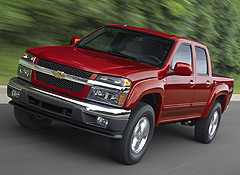General Motors is recalling more than 145,000 pickup trucks because the hoods on these vehicles can fly open and obstruct the driver’s vision when the vehicle is in motion. According to a Fox News report, the recall affects Chevy Colorado and GMC Canyon midsize trucks from the 2010 through the 2012 model years. A majority of the recalled trucks were sold in North America. The National Highway Traffic Safety Administration (NHTSA) states that some of the trucks may not have a secondary hood latch. 
Defective Hoods
So, if the main latch is not fastened, the hoods can open even as the pickup trucks are in motion. The automaker says it is not aware of any car accidents or injuries caused by the problem. The issue has been traced back to a supplier after getting four reports of trucks with missing latches. Truck owners can either check the hoods for missing latches or take their vehicles to a dealer. If there is no secondary latch, GM will replace the hoods at no charge to consumers. Vehicle owners will start getting recall notices in the mail starting next month.
Liability Issues
Based on this news report, it appears that the recalled vehicles have defective hoods that were not properly latched and can fly open when the vehicle is in motion. This can be extremely dangerous because the driver’s vision would be entirely blocked. This could of course lead to major injury collisions. If the hood flies away, it could also pose a danger to pedestrians or other motorists.
Automakers have a legal obligation to consumers to manufacture products that are safe. When an auto defect causes injuries or fatalities, injured victims or their families can file product liability claims seeking compensation for damages including medical expenses, lost wages, cost of hospitalization, rehabilitation and pain and suffering. If you have lost a loved one as a result of a defective auto, you may have a basis for a wrongful death claim. Such claims are usually filed by the deceased victim’s immediate family members seeking damages for medical and funeral costs, lost future income and loss of love and companionship.
Bisnar Chase
Latest posts by Bisnar Chase (see all)
- $50,000 Reward Offered for Information about Fatal Valley Hit-and-Run Case - September 3, 2013
- Man Killed in Compton Hit-and-Run Crash - July 3, 2013
- Twelve Injured in Baldwin Park Cement Truck Crash - July 1, 2013
